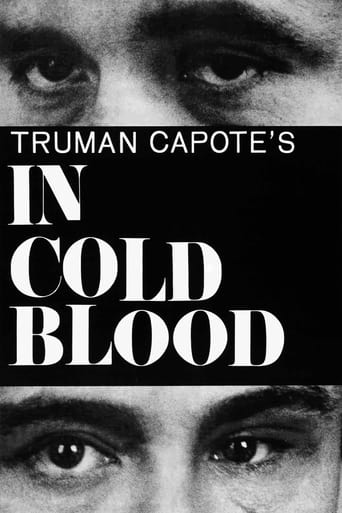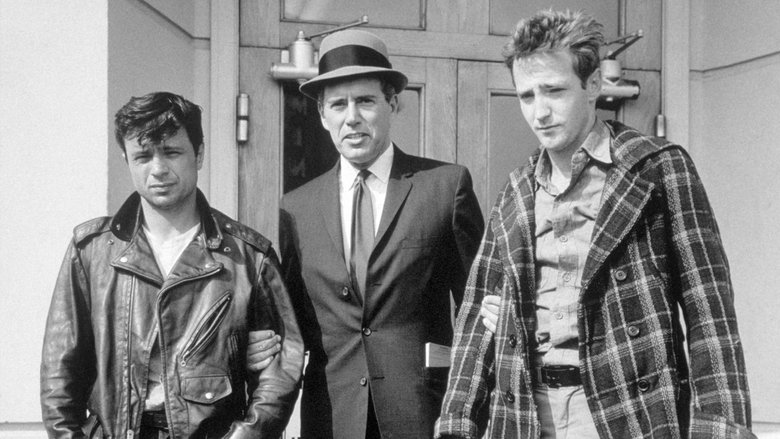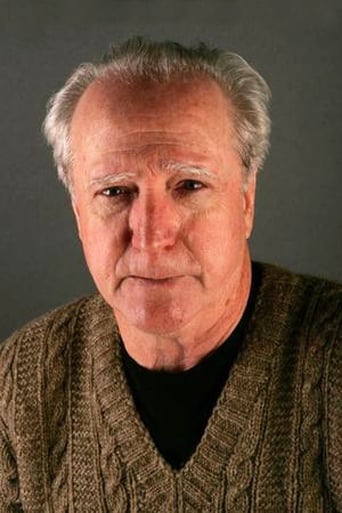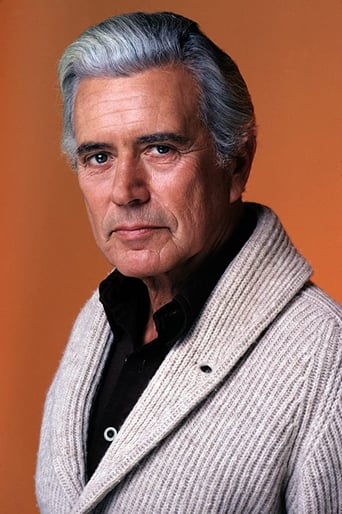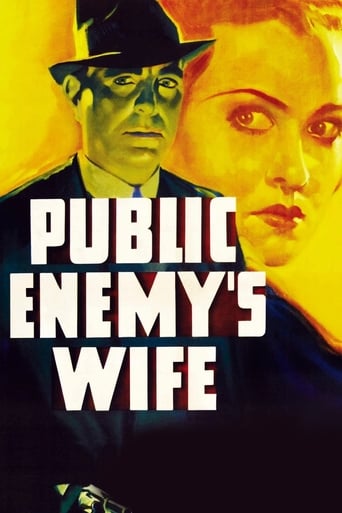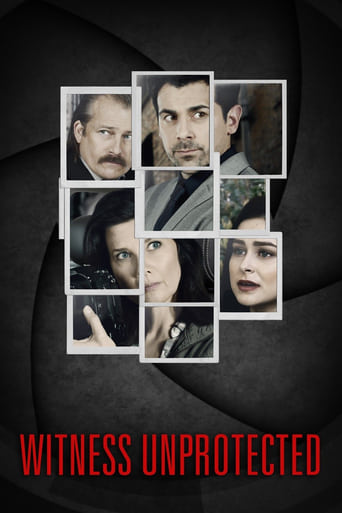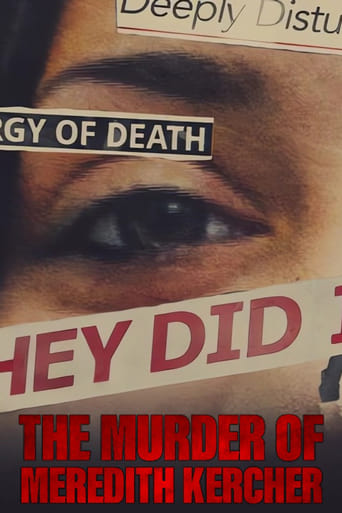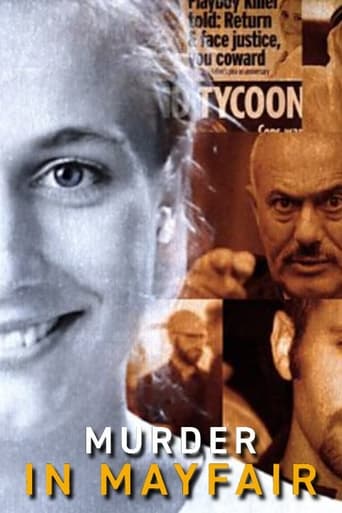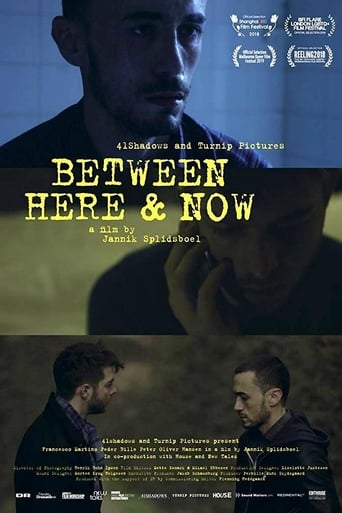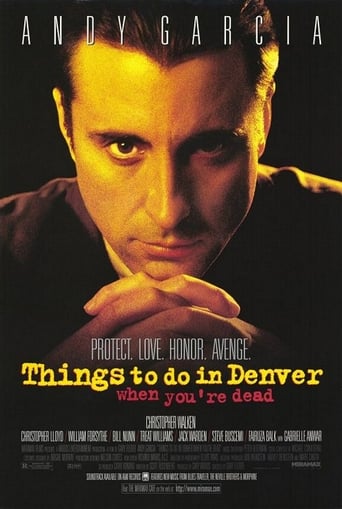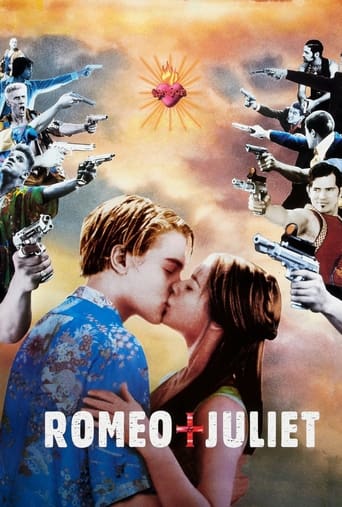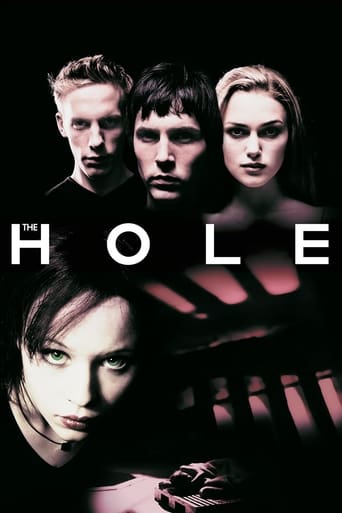In Cold Blood (1967)
After a botched robbery results in the brutal murder of a rural family, two drifters elude police, in the end coming to terms with their own mortality and the repercussions of their vile atrocity.
Watch Trailer
Cast


Similar titles
Reviews
Good story, Not enough for a whole film
Absolutely Fantastic
There's no way I can possibly love it entirely but I just think its ridiculously bad, but enjoyable at the same time.
This is a small, humorous movie in some ways, but it has a huge heart. What a nice experience.
Death comes calling twice over in this grim, gripping depiction of the real-life murder of a Kansas farm family and the subsequent arrest and prosecution of their murderers.At its core, "In Cold Blood" is a powerful argument against capital punishment, suggesting that society is no less depraved than killers Perry Smith (Robert Blake) and Dick Hickock (Scott Wilson). At least the killers can't be accused of possessing reason in snuffing out human life."How can a perfectly sane man commit an absolutely crazy act?" asks a reporter, played by Paul Stewart. The answer, as presented here, is that neither man was sane, nor was the system that ordered them killed.In one of many chilling moments, Hickock explains how he favors capital punishment: "What's wrong with revenge? I've been revenging myself my whole life."But "In Cold Blood" is no celluloid treatise about a social issue. It makes no attempt to soft-soap the nature of Smith and Hickock's crime, with writer-director Richard Brooks shooting the Clutter massacre in a harrowing if not graphic fashion. There are many ghastly moments on screen, but what you don't see is worse for what it leaves to your imagination.Where Brooks does hedge is in the presentation of Smith as a troubled, sensitive soul pushed into killing by cruel circumstance. There's an annoying tendency to go to psychiatry as if everything that the criminals did could be explained away as psychosis rather than meanness. Much time is spent by Stewart's reporter character discussing how Smith and Hickock formed a "third personality" who was the real guilty party in the case. Given how seriously and factually the story is otherwise presented, the Freudian focus comes off as cheap and simplistic.The nature of Smith's role here versus what it was that night in Holcomb, Kansas has been much debated. What can't be debated is the effectiveness of the "you-are-there" format the film takes, or the lived-in performances of Blake and Wilson. Brooks, following the example of Truman Capote's source book, takes a journalistic approach to the material that is sometimes dry but establishes a mood of overwhelming dread.Speaking of "dry," John Forsythe is quite a bit of that in a positive way, playing Alvin Dewey, one of the Kansas Bureau of Investigation detectives assigned to the case. As a counterpoint to the psychopathic Smith and Hickock working the investigation, he shines especially in an interrogation scene where Smith is told he made a key mistake by leaving what another detective calls a "living witness."Who was this living witness? Some argue it's an inmate at a prison with whom Hickock discussed the Clutter crime. Others say it's whichever of the perpetrators watched while the other killed. But the visceral work of Brooks, and cinematographer Conrad Hall suggest another possibility: You the viewer.Whether or not you think the crime is also in the punishment, "In Cold Blood" has lost none of its power to make you care.
'In Cold Blood' is a film written and directed by Richard Brooks whose story is based on the non-fiction novel of the same name written by Truman Capote. The story involves two ex-convicts Perry Smith and Richard 'Dick' Hickock played by Robert Blake and Scott Wilson respectively. They hatch up a plan to rob the Clutters, a wealthy family in Kansas. But during the robbery they find that there is no safe filled with cash and in the heat of the moment they end up gruesomely murdering the entire family. The film follows them on the run as the police try their best to get to the bottom of the crime. Now I don't have much idea about the actual crime and the actual people involved with it. So this review will be solely based on my impression of these people from the film which in turn is based on Truman Capote's impression of the events.I loved how the film starts. The director intermixes the scenes involving Perry and Dick along with the scenes showing the Clutters in their home. This works and acts like a foreshadow for the inevitable brutality that is going to follow. I couldn't help but feel a bit heartbroken to see the scenes involving the Clutters already knowing at the back of my mind, their eventual fate. The director hints at the existing financial inequality in society. He underlines the fact that as long as the imbalance in society exists, crimes like this will go on forever and ever and no one can do anything about it. Families and people will continue to remain vulnerable to evil forces borne out of dissatisfaction. Another very important and interesting aspect of the film is the unpredictability of human nature. Richard Brooks does give you hints and indications as to what triggered the two convicts (Perry in particular) to do what they did by giving you some details of their past lives and their childhood, but in the end Brooks wants you to know that some crimes just take place out of nowhere without much explanation to support it. Human beings with unstable minds and unstable psyches can be capable of the ultimate form of evil. Interestingly, this aspect of the unpredictability of crime is also covered in Bennett Miller's 'Foxcatcher'. It's interesting because Bennett Miller is also the director of 'Capote', the film which follows Truman Capote in his quest to acquire more and more information on this murder of the Clutters while he was working on his book 'In Cold Blood' which serves as the source material for the script of this film.I thought the middle act of the film was a bit uninteresting. It had nothing to do with the pace, it just involved scenes that didn't match the quality of the rest of the film. The procedural element of the film is the only thing of the narrative that I wasn't a big fan of and this is what fills up the middle act. The acting is solid from everyone involved, with bits of over acting in some scenes which is expected as we were still in the 60s and over the top acting had still not completely left Hollywood. The direction and screenplay is brilliant. The recreation of the crime scenes was absolutely brilliant. There are some jump-cuts from one scene to another and the transition was seamless. The last 30 minutes of the film is directed meticulously. The music by Quincy Jones basically revolves around elements of jazz and blues. The music in the film is beautiful to listen to on its own, but at times I found it to be a bit jarring and inappropriate in certain scenes and at times a bit too loud. 'In Cold Blood' isn't a perfect film, but it is certainly a good account of a gruesome crime. It is well directed, it has elements of both procedural films as well as road films. It just shows that no matter who you are or what you do, you are always vulnerable. The American Dream is ideal, but it is not beyond the grasps of evil forces.
... at least for me, because by the end of the movie, I really, really wanted Dick and Perry to die. It wasn't a feeling of revenge. I didn't care if they suffered, in fact it is too bad lethal injection wasn't around before it was, because I'm sure a botched hanging could be an awful way to go. I just had a feeling that the earth was a safer place without these two guys in it. The movie did a great job of humanizing two cold blooded killers in a way that few films had done before. It showed their backgrounds, it showed that Dick was the leader and definitely the more dangerous of the two. He didn't really care that he killed four total strangers, and he was even somewhat apathetic about his own death. Perry probably would have had none of this killing business and just gone on to re-offend and be re-incarcerated for less violent offenses the rest of his life, AS LONG AS he didn't meet up with a stronger more forceful personality such as Dick Hickock, who called Perry on his fantastic tales of untrue crime. Before DNA and the many advances in forensics since 1959, Alvin Dewey has a huge task on his hands. Who would kill four likable people like the Clutters with seemingly no motive? Today the answer is - almost anybody. In 1959 this killing made national news because of its random senseless nature and its rural locale where crime was very low. John Forsythe was mainly an actor on television his entire career, but he was outstanding as the lead investigator in this crime. He keeps the police procedural part of this film quite interesting with his methodical sensible approach.The last part of the film shows Dick and Perry on death row for five years. If you didn't see the first part of this film you'd think these guys were artists, poets, philosophers. That's just because they are being told when to get up, when to go to bed, when to eat, etc. Even the most hardened of criminals will seem OK if you take all of their decisions away from them, and that's how parole boards get fooled, which is something society has learned the hard way over the last 50 years. Or have we? I watch this film and I can't help but think about the Carr brothers. Next to them Dick and Perry look like Rotarians. There are so many similarities. Both killed in Kansas, both picked houses occupied with complete strangers where they thought there was lots of cash, both killed the household dog - the Carrs as a parting shot after executing four people after hours of ritualistic sexual torture and robbery - Dick and Perry killed the Clutter's German Shepherd because they weren't going to be able to get near the Clutters without doing so. Yet the Carr brothers remain alive 15 years after the crime with their death sentence being overturned by the gutless Kansas Supreme Court. Google "Wichita Massacre" to see what I'm talking about.Finally this film teaches how not to react to a home invasion, a term that would not exist for another 35 years after the Clutters were killed. If somebody breaks into your house BECAUSE you are there, you can assume they are after much more than your stuff. Your first duty is ESCAPE because then the criminals realize the clock is ticking, especially in the age of cell phones and 911. Resist with lethal force if you can, escape when you can. If the Clutters had all scattered in four different directions rather than allowing themselves to be tied up to protect the other family members it is likely that at least Perry would have panicked and that would have been the end of it.Most chilling scene to me - Nancy Clutter winding her alarm clock before she goes to bed as a train whistles - the same whistle is heard by Dick and Perry as they slowly drive up to the Clutter home. Her killers and her own death were that close and she didn't have a clue. Highly recommended.
Perry Smith (Robert Blake) and Dick Hickock (Scott Wilson) are life long criminals. They plan to rob a safe in the Clutter family farm in Holcomb, Kansas. They find no money and massacres the family. They go on the run first intending to get into Mexico. The guys are caught. Police detective Alvin Dewey (John Forsythe) leads the investigation. The duo are interrogated until they confess and then convicted.It's fittingly a black and white movie. It is not colorful or sensationalized, and the tense atmosphere is elevated. These are cold hearted killers. Director Richard Brooks gets nominated for his faithful interpretation of Truman Capote's book. The two leads Robert Blake and Scott Wilson are great especially Blake as the damaged and deranged Perry. The killings are left to the last part of the movie and it's very haunting.

